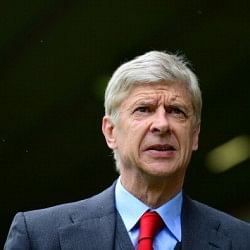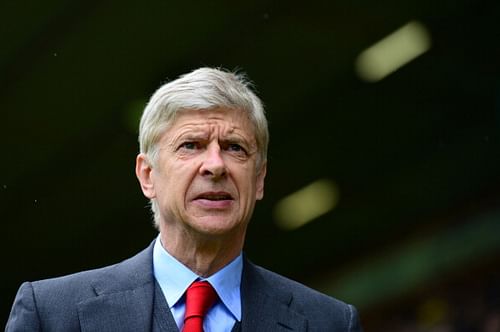
Arsene Wenger's stubbornness - The true reason behind Arsenal not winning titles

Arsene Wenger and his stubbornness a big reason for Arsenal’s failure to win titles?
Arsene Wenger played it well. He always does play it well. Amid some of the most insulting defeats against the top 4 clubs in the away matches of the English Premier League, Arsene Wenger once again, politically correct as always – very beautifully shoved away the blame by giving excuses like financial fair-play, refereeing errors and injuries.
“When we came out of Christmas, we were in a strong position and what you want then is to have your strong players available in March and April, but we had too many injuries”, said the Frenchman as he looked up at the reporter with his blunt smile as usual depicting the expressions that are never expected and giving answers that are always unprecedented.
Giving excuses is what a manager is good at, but with Arsene Wenger it has become a tradition. At a club as big as Arsenal that ranks 5th in the world in terms of value, money is really not as big a problem as it has been portrayed to be. The frugal nature and economic spending that has been attached to the club is really not as much as Arsenal’s as it is Arsene’s. Getting the club to a decent position without spending much is what Arsene Wenger is good at, but the word ‘decent’ in Arsenal’s dictionary has been deteriorating year by year.
“If we don’t win it (Premier League title) I will take full responsibility.
These words were said by Arsene Wenger in February 2014 and they still reverberate in the minds of passionate Gooners as they look up at the Premier League standings which in the span of a month saw Arsenal sliding down to 5th which was never even thought of, before recovering to finish 4th. And at the end of the season, all the manager has said is that there are ‘injuries and injuries’.
So now let’s dig deeper into the scenario. Would Arsenal have won the Premier League title if all the players had been fit?
The answer is as simple as it can be. No.
Arsenal’s major problem this season like every other season has been a face-off against big teams. In the first few months of the season, Arsenal defeated teams like Liverpool and Tottenham, making people think that this might just be what Arsenal needed.
But in the next few matches Arsenal revealed their Achilles heel. The problem was the attack. All the teams could potentially judge the fact that Arsenal’s attack is just not good enough even with the help of world-class play makers such as Cazorla, Ozil and the rest of the army. Even a layman could understand that Olivier Giroud could not be effective in all the games against the big teams, and his predictability was a major reason why Arsenal were far from good in those games.
The team at full strength were defeated by Manchester United who were playing their worst in the past 20 years and soon after that a shameful 6-3 defeat at Etihad made the situation worse. In all these matches, players like Ramsey and Walcott did not prove to be the differentiating factor. The reason being that these players are still in the process of becoming world class but they still lack the killer instinct sometimes in big games. It was clear that Arsenal needed a steady defensive midfielder and a prolific striker who could convert the brilliant passes of their midfield and offer a threat due to his speed.